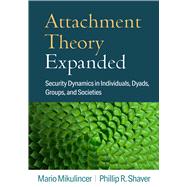From pioneering attachment researchers, this book takes an expansive look at the nature and functions of security dynamics in personal and social relationships. Mario Mikulincer and Phillip R. Shaver examine how attachment operates not only in close dyadic relationships (parent–child, romantic partners), but also between teachers and students, therapists and clients, physicians and patients, leaders and followers, and within organizations. Also considered is the nature of "attachments" to objects; commercial brands; substances, such as foods and drugs; and places. The book highlights ways to integrate attachment theory with other influential social and psychological theories concerning factors that enable individuals, groups, and societies to flourish despite inevitable threats, conflicts, and losses.
See also the related work from Mikulincer and Shaver, Attachment Theory Applied: Fostering Personal Growth through Healthy Relationships.








